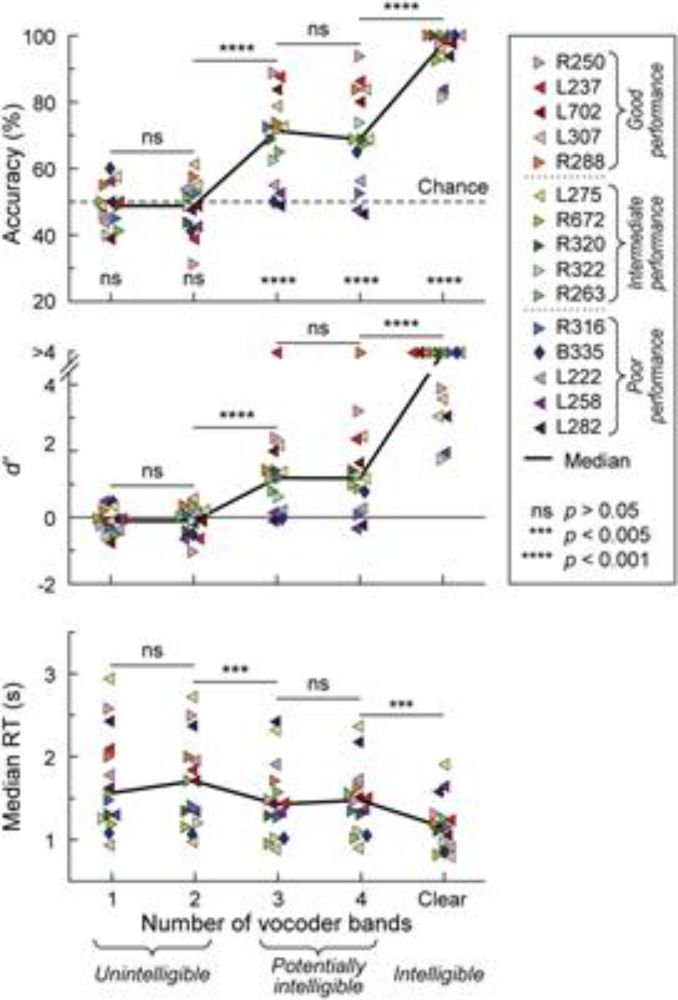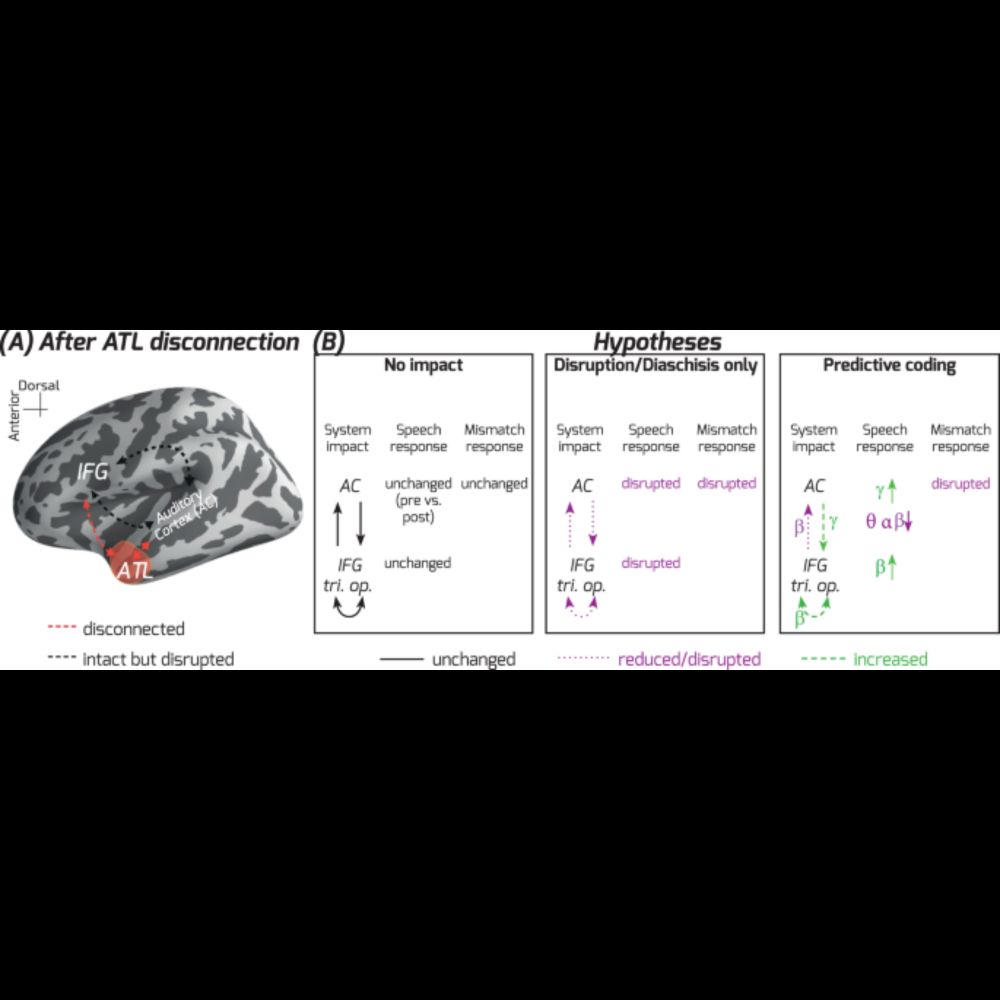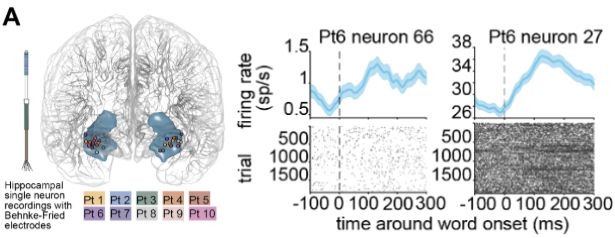
I am incredibly proud to share my first, first-author paper as a postdoc with @benhayden.bsky.social . How does the human hippocampus, known for encoding concepts, represent the meanings of words while listening to narrative speech?
www.biorxiv.org/content/10.1...
27.02.2025 20:17 — 👍 304 🔁 78 💬 12 📌 6
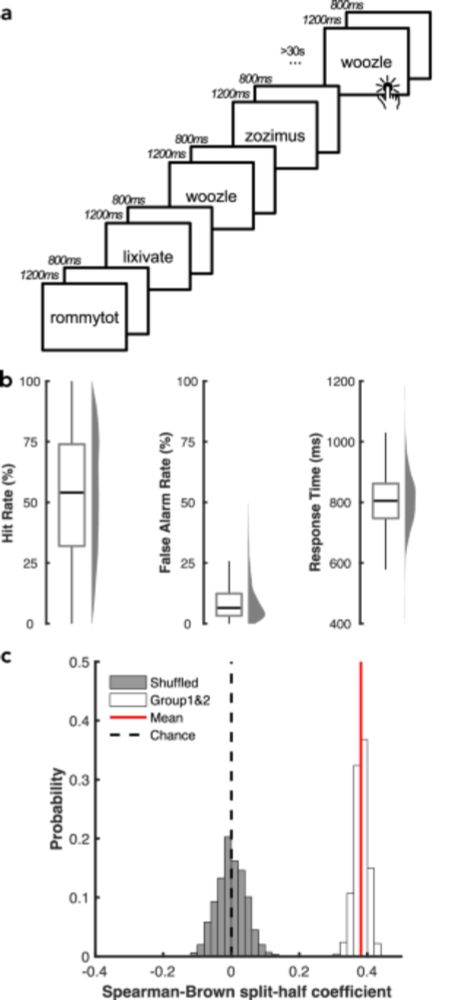
Memorability of novel words correlates with anterior fusiform activity during reading - Nature Communications
To learn new written words, we need to be able to remember their associated letters. Here, the authors show the factors that predict how memorable or forgettable new words are and show a region of hum...
Out now in Nature Comms. To learn a new word, we need to remember it. We track factors driving memory of novel words, showing which words we remember or forget is predictable across people, and isolate a distinct region of fusiform cortex sensitive to this memorability.
🧠📈 #VisionScience 🧠💬
🧵👇
24.02.2025 16:12 — 👍 38 🔁 9 💬 3 📌 2
These results also constitute some of the only - if not the only (to my knowledge!) - reports of single neurons from human anterior insula. Reports from auditory cortex and posterior insula are also surprisingly scarce. Thanks as always to our amazing patients and my awesome co-authors. (5/5)
14.03.2025 15:51 — 👍 3 🔁 0 💬 1 📌 0
Overall, these results are consistent with what others have shown in LFPs, though usually those are examined in behaviorally-relevant contexts. These findings highlight that insula cares about fundamental sound attributes, which is important to know when considering responses to other stimuli. (4/5)
14.03.2025 15:51 — 👍 3 🔁 1 💬 1 📌 0
Many of these neurons also showed clear preferred tuning to particular tone frequencies - completely unsurprising for auditory cortex, but an interesting finding for insula. An important aspect is that there was no task required, so there was no behavioral context for these stimuli. (3/5)
14.03.2025 15:51 — 👍 3 🔁 0 💬 1 📌 0
We find that the activity of ~30% of posterior insula neurons and up to ~15% of anterior insula neurons is significantly modulated in response to these basic sounds. The latencies of these responses are very similar to primary auditory cortex, though the responses are much more transient. (2/5)
14.03.2025 15:51 — 👍 3 🔁 0 💬 1 📌 0
Thank you very much, Liberty! Your awesome work was particularly an inspiration for putting this together, though it's hard to fully convey that in a paper.
14.03.2025 15:31 — 👍 1 🔁 0 💬 0 📌 0
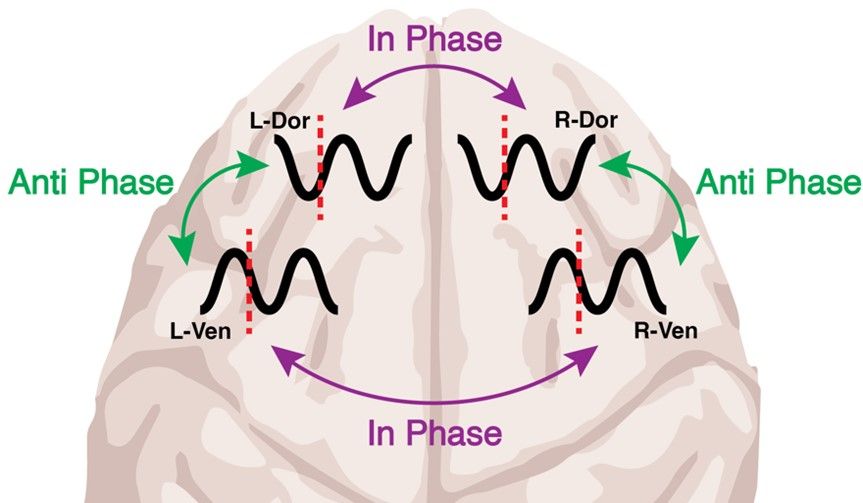
New results!
Despite their varied molecular actions, anesthetics alter brain wave alignment in the same way.
Convergent effects of different anesthetics are due to changes in phase alignment of cortical oscillations
www.biorxiv.org/content/10.1...
#neuroscience
21.03.2024 11:30 — 👍 28 🔁 12 💬 1 📌 0
Thanks as always to my co-authors, and you for reading this! 4/4
21.02.2024 18:48 — 👍 0 🔁 0 💬 0 📌 0
Ultimately, we hope that by clarifying the specific roles of various brain regions in tinnitus, we can start to work towards considering novel treatment approaches that might better account for differences in symptoms and treatment response across individuals. 3/4
21.02.2024 18:48 — 👍 0 🔁 0 💬 1 📌 0
The idea is to re-focus the specific role of this brain structure in tinnitus. In most other literature outside of tinnitus, the hippocampus being involved in maintaining memories is pretty uncontroversial, while in tinnitus it's most often referred to in an "emotional" role. 2/4
21.02.2024 18:47 — 👍 0 🔁 0 💬 1 📌 0
Our new paper on tinnitus and the hippocampus is out now in Human Brain Mapping: doi.org/10.1002/hbm.... The TL;DR is that we are highlighting a role for the hippocampus that focuses on sustaining the memory of a phantom percept, based on current literature. 1/4
🧠📈 #PsychSciSky
21.02.2024 18:47 — 👍 9 🔁 5 💬 1 📌 0
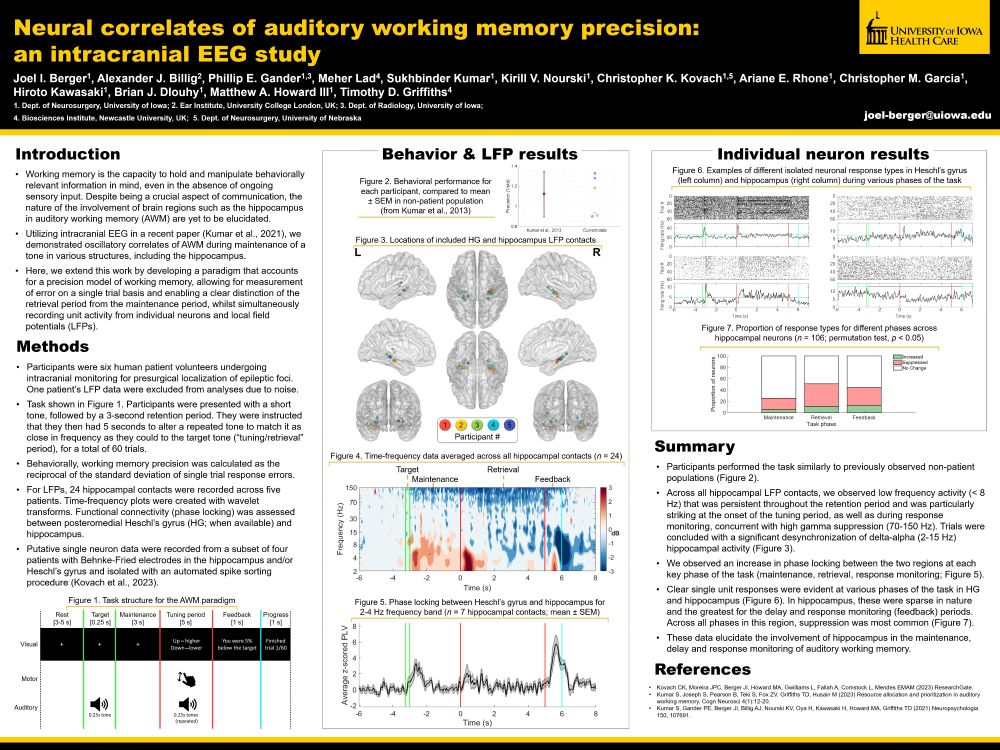
A poster on auditory working memory local field potential and single neuron data collected intracranially in humans.
I'll be presenting the poster below at APAN this afternoon and SfN on Tuesday afternoon, based on the intracranial local field potential and unit data we collect at Iowa. Come and say hi! Thank you to my lovely colleagues and our patients 🧠🟦
10.11.2023 19:33 — 👍 2 🔁 0 💬 0 📌 0
Our work on decoding speech using high-density micro-scale recordings was published today in Nature Communications! We demonstrate the potential of high-spatial sampling technology for future neural speech prostheses.
nature.com/articles/s4146…
The thread below outlines our main findings.
06.11.2023 19:05 — 👍 7 🔁 5 💬 10 📌 1
PLOS Mental Health
Have you heard that PLOS Mental Health is now open for submissions? Learn more about this new global, multidisciplinary #OpenAccess journal: plos.io/MHOpen
02.11.2023 20:18 — 👍 27 🔁 11 💬 0 📌 2
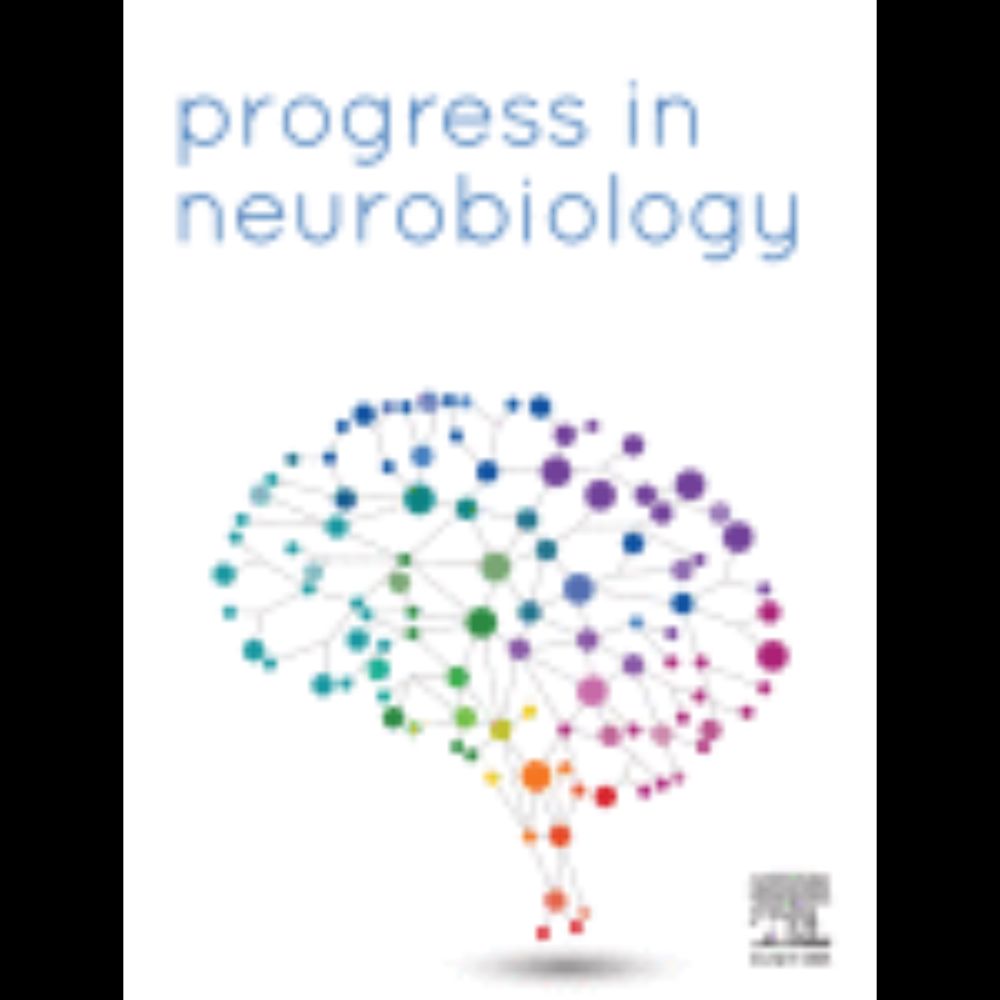
Adverse and compensatory neurophysiological slowing in Parkinson’s disease
Patients with Parkinson’s disease (PD) exhibit multifaceted changes in neurophysiological brain activity, hypothesized to represent a global cortical …
We publish today with @alexwiesman.bsky.social in Progress in Neurobiology another advance in the fight against Parkinson’s disease.
Slowing of 🧠 activity is not systematically an adverse effect of pathology: it can also be a sign of compensatory activity that preserves cognitive functions.
25.10.2023 13:31 — 👍 7 🔁 2 💬 0 📌 2
Are you a neuroscientist who recently joined Blue Sky? Don't forget to like and pin #neuroskyence, the largest channel for all things brain-science related! You can post with #neuroskyence or 🧠🟦 ! #psychscisky 🧪 #academicsky bsky.app/profile/did:...
25.10.2023 07:49 — 👍 46 🔁 23 💬 2 📌 0
I will do - he was speaking highly of you the other day, in fact!
22.10.2023 12:43 — 👍 1 🔁 0 💬 0 📌 0
Thanks as always to my co-authors, Sukhbinder Kunar, Paris Ash, Ester Benzaquén and Phil Gander, as well as everyone who took part in the large online misophonia study. And you, for getting to the end of this thread! (6/6)
21.10.2023 23:51 — 👍 1 🔁 0 💬 0 📌 0
Ultimately, all of this works towards reframing misophonia in a way that we can properly understand the mechanisms behind the disorder and lead towards developing effective treatments for individuals with misophonia. (5/6)
21.10.2023 23:50 — 👍 2 🔁 0 💬 1 📌 0
In the second paper, Sukhbinder, Phil & I frame misophonia within a social cognitive framework, highlighting that a sound-based model of misophonia misses key components, such as importance of social context, involvement of motor cortex & insula, and high mimicry prevalence. (4/6)
21.10.2023 23:50 — 👍 1 🔁 0 💬 1 📌 0
Mimicry is elicited most frequently during orofacial trigger sounds and can often provide some degree of relief. These results and previous imaging literature highlight the importance of the perception of the actions of others in triggering misophonia. Hence the next paper... (3/6)
21.10.2023 23:49 — 👍 1 🔁 0 💬 1 📌 0
The first paper was based on hypotheses created by some of Sukhbinder's and others' earlier fMRI findings, which implicated the motor cortex in misophonia, as well as anecdotal and small case reports. In a large cohort, we find a high prevalence of mimicry in misophonia (2/6)
21.10.2023 23:49 — 👍 1 🔁 0 💬 1 📌 0
Two new misophonia papers from our group. First (bit.ly/mismi), led by Paris Ash and Sukhbinder Kumar examines the incidence of mimicry in misophonia. The second (bit.ly/SocMi, preprint) presents misophonia within a social cognitive framework (1/6)🧵in comments #Psychology #PsychSci 🧠🟦
21.10.2023 23:48 — 👍 8 🔁 2 💬 4 📌 0
Come join the lab! I'll be at SfN if you want to chat about the cool things we're up to or about the position.
16.10.2023 19:16 — 👍 1 🔁 1 💬 0 📌 0
ReadCube link here: rdcu.be/dokvD
11.10.2023 18:06 — 👍 0 🔁 0 💬 0 📌 0
My colleague Phil Gander and I are looking to hire a postdoc for collaborative misophonia research in Iowa. We're keen for people who are interested and experienced in fMRI/EEG analyses, with the opportunity to learn analyses of human intracranial data: jobs.uiowa.edu/postdoc/view... #neuroskyence
06.10.2023 15:02 — 👍 4 🔁 2 💬 1 📌 0
Research Scientist in Hamm Lab at Nathan Kline Institute
Auditory neuroscience, neural circuits, predictive coding, tinnitus
Previously: University of Salamanca, University of Michigan, University of Nottingham
Postdoc in the Hayden lab at Baylor College of Medicine studying neural computations of natural language & communication in humans. Sister to someone with autism. she/her. melissafranch.com
Neurobiology & philosophy of language • Intracranial mapping of syntax-semantics
Website: https://elliot-murphy.com/
Oxford Postdoc in the Staresina Lab | Sleep | Memory | Human Olfaction & Single Neurons
Investigating how the brain interprets sound / making music
Assistant Professor | Department of Neurosurgery | Rutgers RWJMS
Untangling human choice, emotions, and memories with direct-brain recordings.
Lab: https://sites.rutgers.edu/qasim-lab/
Professor of Psychology @ UNLV. Associate Editor for @jephpp.bsky.social. Researching #Music/ #Auditory Cognition since the last century. Helped found UNLV's Neuroscience Ph.D. program and served as director until July 2022.
UKRI Future Leaders Fellow,
Professor of Computational Neurology, Newcastle University.
Working on epilepsy, surgery, neuroimaging, EEG, nonlinear dynamics, complex networks.
www.cnnp-lab.com
Postdoc in Functional Neurosurgery Section NIH/NINDS interested in brain stimulation and memory
PhD @ColumbiaBME
BS @JHUBME
Views are my own
Human neuronal computations during cognition @ Utah. Www.neurosmiths.org
We are a computational neuroscience lab co-located at Aarhus University and Cambridge Psychiatry. Our research investigates how our decisions, emotions, and conscious perception are shaped by visceral and embodied processes.
https://www.the-ecg.org/
Postdoc at Brown using biophysical computational modeling + cog neuro methods to understand inhibitory control mechanisms in health and disease. 🧠🛑 (she/her)
Principal Researcher @ Microsoft Research.
Cognitive computational neuroscience & AI.
Writer. Nature wanderer.
www.momen-nejad.org
🧠doctoral candidate @ University of Iowa
👩🔬mental health, social cognition, neuroimaging
🎙️podcaster @ educated but confused
🏳️⚧️pronouns: they/them ✨
Professor of Auditory Neuroscience at Newcastle University. Science and hinterlands.
Postdoctoral Researcher • PhD in cognitive psychology from Ohio State • I study (and have) misophonia! (she/her)
Auditory neuroscientist, UCL Prof, trail runner, landlocked boaty, mum was @bizifer elsewhere
Researcher in Neuroscience & AI
CNRS, Ecole Normale Supérieure, PSL
currently detached to Meta
Studying speech using intracranial recordings and EEG. Opinions my own.




